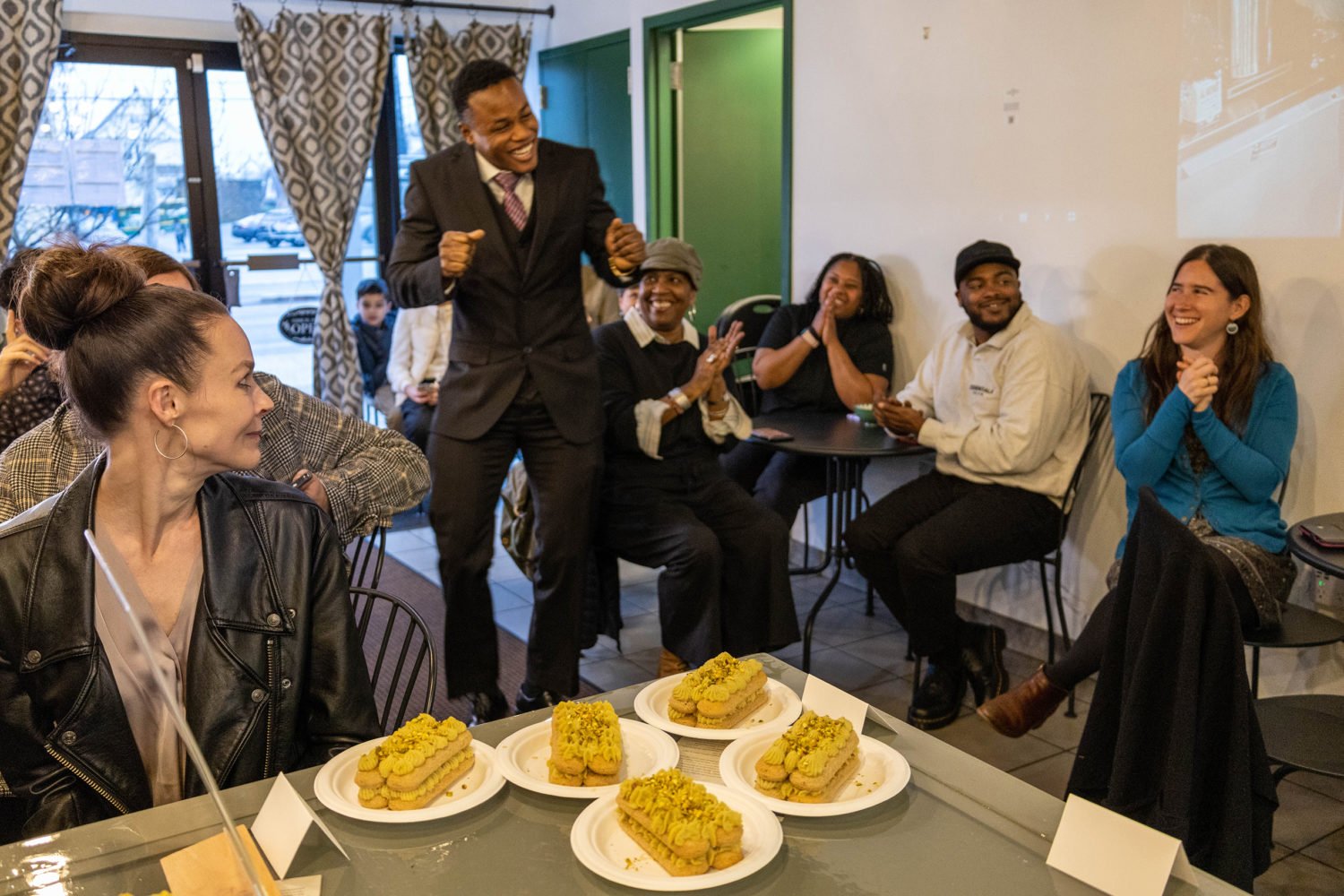Sarah Godfrey is a staff writer at Washington City Paper and writes frequently about music for the Washington Post. This is her first piece for The Washingtonian.
It's 15 minutes before Restaurant Eve opens for dinner on a Saturday night, and co-owners Cathal and Meshelle Armstrong are at opposite ends of the restaurant, getting ready.
Cathal, the chef, pulls on a toque before taking his position in the kitchen; Meshelle, the restaurant's manager, ducks into a bathroom to apply lipstick and a black pageboy cap with a rhinestone pin.
The manager and chef pass each other in the restaurant's mirrored corridor without so much as a glance. Meshelle goes into the chef's tasting room to joke with members of the staff as they arrange tables and Deruta place settings. Cathal marches into the kitchen and directs preparations there.
The Armstrongs, both 36, have been together for 14 years, married for eight, and business partners for two. Restaurant Eve, in Old Town Alexandria, is their dream venture, the union of two different people and two different philosophies. Cathal is tall and stony with an impish streak; Meshelle is instantly familiar and able to smile through most any disaster.
For all their differences, they work together in the kind of quiet tandem that loving couples can pull off. Proximity has its rewards: Meshelle has much better access to her husband than when they worked at separate restaurants before the 2004 opening of Restaurant Eve. She can now pop into the kitchen to give Cathal a squeeze anytime she likes–he always swats her away. And they can bring their children, Eve, six, and Eamonn, three, to work on occasion and better coordinate their schedules to allow for family time.
But more often than not, they work autonomously. During business hours they are manager and chef, and running a restaurant doesn't always allow for such marital niceties as smiles.
At 6 PM a couple enters the restaurant and tells Meshelle, at the hostess stand, that they have a reservation in the prix-fixe Tasting Room. Meshelle says there must be some confusion–a private party has reserved the space for the evening. She offers to seat them in the bistro and have the chef send out some special treats to supplement their selections from the à la carte menu. After the couple agrees and Meshelle escorts them to their table, her smile disappears, and she rushes off to find Cathal. Spotting him in the hallway, she tells him the game plan.
"I'm all over it," Cathal says.
Before they break the huddle, he mentions another problem: They missed their son's dentist appointment.
"Oooh, when was it?" Meshelle asks.
"Thursday. They sent an e-mail," says Cathal.
"That's the nice thing about working with your husband," Meshelle says later. "He'll always cover my ass."
The Armstrongs didn't go into business together to play house away from home. They partnered so they could open the restaurant each wanted in the same historic building with the guidance of a trusted restaurant veteran. Meshelle's brainchild, a casual bistro serving upscale comfort food, sits right next to the more formal tasting room that offers up the adventurous juxtapositions Cathal favors. And just as Meshelle's talkative, easy-going nature and Cathal's more serious demeanor lend them balance as a couple, her touches keep the tasting room from becoming precious while his influence ensures that the bistro is never too relaxed.
"The restaurant is a compromise between what she wants and what I want–we've learned where we'll compromise and where we won't," says Cathal.
Cathal and Meshelle stop short of calling their restaurant a labor of love, but Eve is just that. The teamwork that has turned the restaurant into a popular, critically lauded destination probably could not exist independent of their marriage. From the menu to the decor, almost every element of Eve contains a bit of Meshelle's exuberant charm and Cathal's reserved sweetness. The dining areas are tastefully decorated–but in a quirky signature palette of green and orange. The servers are youthful and energetic but project the poise of white-haired waiters at a downtown steakhouse.
Being married has helped the Armstrongs reach a level of compromise that two restaurateurs not in love might not be able to handle, but the question remains: How can a married couple keep it together when working long hours together six days a week and trying to please children, staff, patrons, themselves, and each other?
"Marriage in itself is a compromise," Meshelle says. "Add a restaurant to the mix and you have a potential disaster."
At around 7 PM, Meshelle's guest-relations skills are again put to the test. As she ushers a couple into the bistro, the young man whispers to her that he might propose this evening and asks, "What can you do?"
Meshelle and Cathal have a soft spot for romantic gestures in restaurants. They met while working at Cities in the early '90s. Meshelle was a manager at the Adams Morgan restaurant; Cathal was on loan from nearby New Heights to run a temporary pizza bar. Meshelle thought Cathal was a snob, but he changed her mind by making personal pizzas for Cities staff and exhibiting a passion for campy horror films.
Several years later they got engaged at the Four Seasons. So they are honored when someone chooses to pop the question at their place. Usually, Meshelle will have Cathal make a ring box of sugar and whip up a special dessert. "He loves doing that sort of thing," she says. "He's the romantic–not me."
But with the short-notice request, Meshelle has to impose on her husband for the quick culinary favor. She asks him to make an off-menu sugar apple for the couple to share. He agrees–and tops it with a personal gesture. A few minutes before eight, told that the just-engaged pair is leaving the restaurant, Cathal wipes his hands and steps into the hallway to congratulate the couple.
When the chef visits the dining room, it usually is a concession to his wife, who encourages Cathal to introduce himself to diners; he takes little pleasure in flesh-pressing. "I'll come out and say 'Good evening, how is your meal?' and they'll say, 'It's wonderful. Can we have some more bread?' " Cathal says.
So schmoozing is left to Meshelle. But Cathal is happy to oblige her special requests: canapés for a party that has endured a long wait for a table, extras for diners celebrating a special occasion. Sometimes, a request proves too much for the chef's sensibilities. Recently, Meshelle booked a party that requested chicken, knowing that Cathal has abandoned the bird in favor of more interesting fowl, such as quail and pheasant.
"I told him that this party really wanted chicken," Meshelle recalls. "And what did you say, honey?"
Cathal smiles thinly. "I said they can go next door to Holiday Inn for chicken. They have a buffet–$6.95–and they can eat as much chicken as they'd like."
As usual, the couple reached a compromise, settling on poussins. "Since it's a tiny little special chicken, he said he would do it," Meshelle says.
Cathal tends to defer to Meshelle on front-of-the-house decisions, and she will acquiesce when it comes to the kitchen, but not always–they are both headstrong and sometimes unwilling to budge.
Cathal, who says he likes the restaurant to be "quiet and reserved" while Meshelle treats it as a "big, crazy, happy family," insists on certain formalities in the dining room. "I try to impose more discipline," he says. "Not in a German, militaristic sense but . . . more clean."
When Meshelle wanted birthday cake–a pink-frosted, grown-up version of the kiddie party staple–added to the dessert menu, Cathal agreed.
"There are things I would never do in the kitchen if it weren't for her," he says.
Tonight is an easy one for Cathal. Around 8:15 he is sending out the first courses for the private party and singing "Jingle Bell Rock." The event in the tasting room means a less hectic evening for the kitchen–traffic is normal in the bistro, but Cathal and his staff have to cook for only 17 tasting-room guests instead of the usual 50.
As Cathal sings, he cranes his neck to catch a glimpse of Meshelle. Thanks to a glass wine cellar between the kitchen and the hostess stand and a series of mirrors, the couple can see each other as they work. "I can see how the whole restaurant is going by looking at her," says Cathal.
Even when Cathal can't spot Meshelle, he usually can hear her laughing and talking with waitstaff and guests, but right now things are silent.
"I don't hear her giggling," he says, furrowing his brow. He steps into the hallway and finds her pacing near the bar. She's concerned that the diners who arrived for dinner at 6 are nowhere near leaving, which means those with later reservations can't be seated.
Cathal nods as he listens to her vent, then returns to the kitchen without giving her a hug or any other sort of reassurance. It is better, he thinks, to act as a sounding board than to risk patronizing his wife with a kiss or a pat on the head.
Meshelle says Cathal knows how to react in times of crisis and keep her sane. Before the restaurant's 2004 opening, she says, Cathal reassured her that their venture would be a success and their financial risk would pay off. "I'm stressing–'Our house, our house!' " she says. "He's calm, telling me, 'I can always cook and get a job, you can always do this, the children will always be fine.' "
The Armstrongs knew if they could weather the opening of Eve, subsequent challenges would pale in comparison. While contending with historic-preservation laws, investors, debtors, and delays, they were often at each other's throats.
"Opening day I went to code enforcement," Cathal recalls. "I said, 'We have to open tonight or we're going to go to jail.' "
"Or kill each other," Meshelle says. "Everything was dependent on this, the two of us–this is everything here."
Meshelle leans on Cathal for support, but just as often she assumes the role of comforter. On a night Meshelle arrives at work later than usual and doesn't see her husband right away, she asks the kitchen staff where he is. They point to the walk-in refrigerator. Cathal is inside, throwing out items that have languished and can no longer be served.
Meshelle lets Cathal fling food, but toward the end of the night, she meets him at the bar with a glass of wine and musses his hair, asking when he's going to get it cut. His shoulders drop, and he leans on the bar. He says he's going to use the spa certificate she gave him last Christmas to get a trim, manicure, pedicure, and massage.
"Oooh, I'll have a good-smelling husband," Meshelle coos. "At least for a little while. Hey," she teases, "remember when you were cranky?"
"Not cranky," he replies. "Focused."
At around 9, manager and chef are both engrossed in their work. Cathal is wrapping up the tasting-room service, and Meshelle is working through the height of "the turn," the point when nearly all parties with reservations for the second seating have arrived but the bistro is still filled with early diners.
As the evening wears on, Meshelle and Cathal are less recognizable as a couple. Even the pats on the arm disappear. By 9:15 they function as an organized pit crew. Meshelle walks into the kitchen and says, "Okay, I need canapés for four"–an effort to appease diners who've been stewing at the bar. Unlike her earlier requests, she doesn't grab her husband and whisper in his ear–she barks out her need from the doorway and exits. "Canapés for four," Cathal says to Nathan Beauchamp, then the restaurant's chef de cuisine.
At 9:30 Cathal crowds into the area behind the hostess stand with Meshelle and two staff members and squints at the reservation book's seating chart. "You have a VIP at table 43," he tells Meshelle. "In seat four. She runs the Supreme Court building."
"Well," she replies sarcastically, "thanks for telling me!"
Although she seems annoyed that this bit of intelligence has come halfway through the meal, Meshelle acknowledges that she's as bad at spotting notables as Cathal is at making nice with them. So Cathal is responsible for celebrity sightings.
The partners are honest about their strengths and weaknesses. "If we were in another restaurant, I think people would just do what he says and tell him what he wants to hear," Meshelle says. "The same with me–with the dining room, my ideas. Someone else might just always say, 'Sure, that's great, do whatever you want.' "
"Are you crazy?" Cathal says, laughing. "I say that all the time–'Yes, dear.' "
Around 10:30 the couple begins winding down. The last dishes go out around 11, and it becomes a waiting game–biding time until the guests leave so they can have a meal of their own. Every Friday after the last of the diners have gone, Cathal and Meshelle have "date night." They close up shop and treat themselves to the finest meal the nearest McDonald's has to offer.
"People always say to me, 'You must eat like a princess, a queen,' " Meshelle says, rolling her eyes.
As tonight's date draws near, the couple begins making the transition from chef and manager to husband and wife. They huddle on the small couch in the restaurant's entryway and talk about the evening. They have gotten through another night without a big crisis or disagreement, and tomorrow their task will be to get through a day at home with the same results.
The next morning, despite being up late the night before, they will wake early and spend time with their children. Sunday is their "sacred day," when the restaurant is closed and they run errands, watch movies, and on occasion enjoy a family meal at Outback Steakhouse.
"If we didn't make it a point to schedule family time, it wouldn't happen," Cathal says.
Try as they might to put business aside on Sunday, work still creeps in–they sometimes read food blogs and field employment calls.
And it may soon be even harder to get away from business for a day. They plan to open a fish-and-chips place they will call Eamonn's so their daughter can no longer tease their son that she has a restaurant named after her and he doesn't.
Although their tightrope act is sometimes precarious, the couple is unafraid to add new elements that risk the balance. No matter how many tasks they pile on, they seem eager to assume more–as long as they can depend on their partner to spot them. The new business will mean more time split between work and home, more time spent as manager and chef rather than husband and wife, more compromises.
"It's a challenge," Cathal says. "It's a challenge for business, a challenge for family life, and a challenge for married life. I like challenge."
He smiles at Meshelle. She smiles back.

















